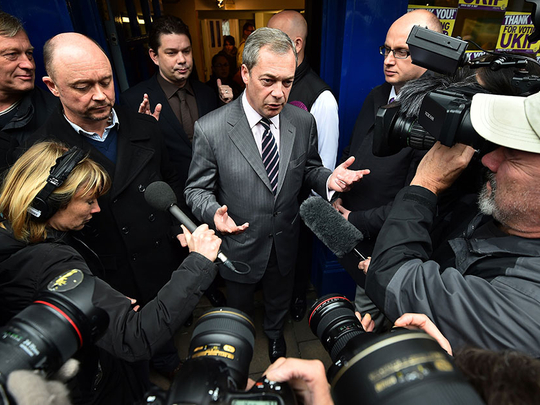
LONDON: As expected, Ukip walked the Rochester and Strood by-election. Mark Reckless won Nigel Farage’s party its second Westminster seat, defeating Conservative candidate Kelly Tolhurst by 2,920 votes. Ukip took 42 per cent of the vote, the Conservatives 35 per cent. This was a 28 per cent Conservative to Ukip swing. With 349 votes (0.9 per cent), the Liberal Democrats recorded the party’s worst ever result in a Westminster election, finishing fifth, behind the Greens’ 4 per cent.
Labour dropped 12 points on their 2010 result, and ended up with 17 per cent of the votes cast. Despite this poor result, the bar of expectation had been set so low by Labour that Ed Miliband would have been hoping to watch the spotlight turn on David Cameron — but his party was able to tweet its way into Friday morning’s headlines.
While some play Tory defection bingo, beneath their feet British politics is changing in unprecedented ways.
Recent polls show the combined support for Labour and the Conservatives on about 60 per cent — down by about 10 points on January. In elections since 1979, Britain’s two main parties won a combined 81 per cent, 70 per cent, 73 per cent, 76 per cent, 74 per cent, 73 per cent, 67 per cent and 65 per cent in 2010. While the trend is clear, its depth is better highlighted once we take a step back to look at the changes among other parties. In 2010, for example, the Lib Dems won 23 per cent of vote, leaving all other parties on a combined 12 per cent.
Recent polls have the SNP, Ukip and Greens together above 25 per cent. In 2010, the three parties won a mere 6 per cent of the vote. The fact is all the more remarkable considering the SNP is a Scottish party, and the Greens and Ukip don’t contest all seats.
Figures released over the past month show the SNP is on course to winning nearly nine times more Westminster seats than all other parties in Scotland combined. Labour, which currently holds 41 seats north of the border, would be all but wiped off Scotland’s electoral map.
There is not only a rise in support for the “others”, but there is also far greater fragmentation across the electorate. YouGov analysis has found that the proportion of Ukip voters coming from the Labour party has trebled since January 2013, from 7 per cent to 23 per cent. While this is still lower than Tory converts (36 per cent), compared with earlier Ukip support Farage’s votes are now more widely distributed. Before the beginning of last year six out of every 10 Ukip votes came from the Conservatives.
Similar trends are present in flows towards the Greens. More than 80 per cent of the party’s vote in 2015 will come from those who in 2010 supported other parties. Half of that support is coming from Lib Dem voters.
Britain has gone from a two-three party system to a six-party system. The challenge is that the UK’s voting system isn’t designed for a multiparty system. Voting systems are a reflection of a country’s political system, culture and history. An attempt to summarise these factors in a balance between governance and representativeness.
In a landscape historically dominated by two parties, first-past-the-post works relatively well. But the method is less efficient when votes are more distributed across a much bigger number of parties and the representativeness gap widens. On 6 per cent, but with say only one MP, the Greens would win 40 times fewer seats than they would under proportional representation.
There is of course an elephant in the room, which should not be ignored — Britons said no to changing the voting system in a 2011 referendum. Nevertheless, circumstances have changed over the past three years and, more importantly, the representation gap matters if we look at the underlying reasons behind the fragmentation currently present in the country’s electorate — a crisis of trust.
Only 10 per cent of UK voters believe that British politicians are out to do their best for their country. In 1972, the figure was 28 per cent. It’s not just Ed Miliband who is unpopular. All of Westminster’s political leaders have negative ratings: more people are dissatisfied with party leaders than the number happy with them — even Farage. Meanwhile, 68 per cent of Ukip voters would like to turn the clock back to the way Britain was 20-30 years ago.
Conversely, in Scotland 65 per cent of voters are satisfied with new first minster Nicola Sturgeon and her predecessor Alex Salmond.
Instead of tackling the trust deficit, the main parties are turning the election into a contest about fear — and what voters should be frightened of most. Labour warns of the imminent collapse of the NHS. The Conservatives of an impending global financial crisis. Ukip had claimed that hundreds of thousands of Romanians were heading for these shores. Millions of Romanians did queue a week ago — often for hours — but to elect a new president and they did so at home in numbers not seen in 14 years.
The next election should be about trust, instead it will be about fear.
— Guardian News & Media Ltd












